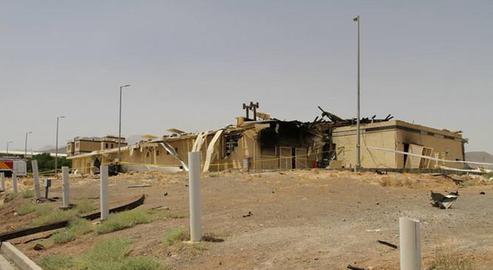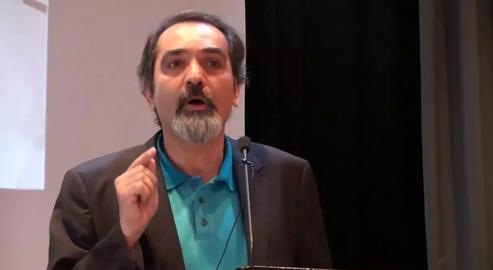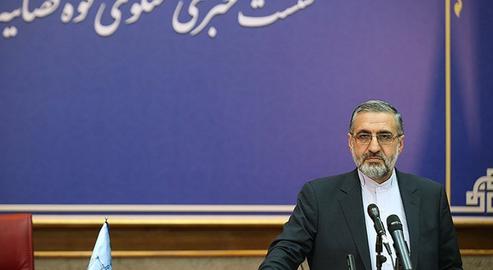One day after the announcement of the reconstruction of a "new generation centrifuge assembly center,” at Iran’s Natanz nuclear facility, officials of the Iranian Atomic Energy Organization reported "an incident which occurred in a part of the electricity distribution network of Natanz enrichment facilities."
On July 2, 2020, an explosion destroyed the Iranian Centrifuge Assembly Center and now, once again, due to a reported explosion destroying the facility’s power generation, activity at this center has been brought to a halt. Shortly after the July attack, the New York Times reported that it would take two years for Iran's nuclear program to return to full operation.
The full extent of the latest attack – widely attributed to Israel – is still unknown.
In an interview with IranWire, Mehran Mostafavi, a nuclear physics expert and political analyst, took the damage to the Natanz facility seriously and called it a blow to the honor of the Islamic Republic.
***
Officials at the Atomic Energy Organization of Iran have said that an incident took place on April 11 at the Natanz nuclear facility where Iranian authorities operate centrifuges to enrich uranium. The facility suffered a full power blackout. But the Natanz electricity supply is independent of Iran’s national grid – meaning that the disruption to its power supply must have been due to a local incident.
Global media reports have suggested that an explosion at the Natanz electricity generator was responsible for the blackout.
But in an interview with IranWire, Mehran Mostafavi, a nuclear physics expert and political analyst, based in France, said that although Iran's electricity grid is independent, it is connected to the computer network at the Natanz facility. A computer virus entering the system at Natanz could therefore also affect Iran’s national power grid.
Mostafavi added that centrifuges consume considerable electricity, and because of this, the destruction of the electricity supply will seriously disrupt Iran's nuclear program.
Islamic Republic officials have not yet detailed the exact damage resulting from the incident. But a spokesperson said: ”This incident did not cause any human casualties or pollution and its causes are under investigation.”
Mostafavi also said that the reaction from the head of Iran’s Atomic Energy Organization, Ali Akbar Salehi, in which Salehi said “we reserve our right to act against the perpetrators” of the blackout, shows the seriousness of the incident.
The Israeli public broadcaster KAN later reported that the "incident" at the Natanz nuclear facility was the work of Israel and the result of "the country's new cyber-attack on Iran.” The Israeli government has not publicly taken responsibility.
Iranian authorities had already assumed Israel to be responsible for the incident – along with numerous other previous cyber-attacks and assassinations targeting Iran’s nuclear program. The expectation had been in recent months that Iran’s newest nuclear facilities, built underground, would be safer from attacks.
A Loss of Dignity
The April 11 attack, just one day after Iran’s Atomic Energy Organization announced Natanz had been fully rebuilt, and was planning to reactivate its centrifuges, was a disgrace to the Islamic Republic and a show of strength for Israel.
Mehran Mostafavi, the analyst, also said the incident shows weakness on Iran’s part and that the Islamic Republic, despite spending hundreds of billions of dollars on the nuclear program, cannot ensure the security of its work.
Analysts had previously said that the purpose of Israel's actions against Iran’s nuclear program – including the the assassination of Mohsen Fakhrizadeh, a key figure in Iran's nuclear program before he was killed by gunmen outside Tehran in November 2020 – was to influence the P5+1 nuclear talks with Iran and to send a message that Israel will not tolerate a weaponized Iranian nuclear program.
The nuclear talks resumed last week in Vienna with indirect contacts between Iran and the United States facilitated by the P5 powers.
Mostafavi also said that influencing the new Vienna talks and sending a message to the Iranian government was the motivation for Israel’s alleged actions. And he added that Iran’s Supreme Leader Ali Khamenei had domestic political reasons as well as technical and strategic goals in pursuing a nuclear capacity.
A number of European officials, including French Foreign Minister Jean-Yves Le Drian, have previously said that former US president Donald Trump’s policy of maximum pressure in Iran had backfired, and that the Iranian government was not particularly delayed in advancing its nuclear program or in acquiring nuclear weapons.
Analysts have suggested that remarks such as these are designed to smooth the path to a quick new nuclear deal between Iran and the P5+1 powers.
Mostafavi meanwhile has warned that Iran is technically capable of making bombs – with caveats.
Plutonium and uranium enrichment are two ways to produce a nuclear bomb. Converting a heavy water reactor at Iran’s Arak facility, to light water, was one of the provisions of the 2015 Joint Comprehensive Plan of Action nuclear deal. The provision means that enriching uranium is now Iran’s only viable path to producing a nuclear weapon. Uranium must be enriched to 90 percent – which takes three months.
Enriched uranium is also just the first step, Mostafavi has said. Iran would also have to produce precision-guided missiles, and carry out underground tests, before a viable weapon could be deployed.
According to Mostafavi, although Iran is technically capable of building a bomb, in practice the procedure has not been possible; as soon as it takes a definitive step, Israel has allegedly thwarted its actions by sabotaging and even bombing nuclear facilities.
The analysed emphasized that even if Iran’s facilities are underground bombing the entrances to them would be enough to disrupt operations. And it is impossible to move the centrifuges to secret locations because the attempt to do so would alert intelligence agencies around the world – provoking a likely bombing of the relocated equipment.
China and Russian have meanwhile also said that they would not tolerate an Iranian nuclear weapon.
The Domestic Factor
According to Mostafavi, only under one scenario might the leader of the Islamic Republic order the construction of a nuclear bomb, and that is under pressure from domestic politics.
Building a bomb, and the subsequent events it would unleash or accelerate such as the bombing of facilities and conflict with outside powers, will give the Islamic Republic the conditions it needs to more easily repress political dissent in Iran.
The attack on the Natanz nuclear facility suggests that negotiations to revive the JCPOA are more difficult than was reaching the initial agreement. Israel has also chosen to be less tolerant than in the past – whereas Khamenei's position remains unclear.
Khamenei’s apparent policy – of alternately pushing forward on developing a nuclear weapon, and stepping back from the brink – belies the fact that he would prefer for the nuclear sanctions being imposed on Iran by the United States to be lifted.
Analysts also said that Khamenei will not allow the nuclear deal to be again used a a card in Iran’s upcoming presidential elections.
Mostafavi also said that Khamenei does not want President Hassan Rouhani to conclude a renewal of the nuclear agreement – and for sanctions to be lifted – on the eve of the election scheduled for this coming June. Khamenei will, according to one analyst, only allow an agreement to proceed if he wants to see large turn-out at the election.
Mostafavi added that Iran’s civilian needs for enriched uranium are for its Bushehr nuclear reactor – but that these needs are already met by the Russians. The head of the Bushehr reactor had previously said that Iran may not have the funding to maintain the reactor, and it may be forced to shut down next year.
Mahmoud Jafari, deputy director of the Atomic Energy Organization, had said that the Bushehr plant could be shut down due to problems with currency transfers and the provision of foreign exchange resources to buy spare parts from Russia.
Mostafavi, meanwhile, emphasized that Iran's nuclear program has no technical or rational justification, and that in practice the Islamic Republic has taken the Iranian people hostage by expending so much political and financial capital on the project.
visit the accountability section
In this section of Iran Wire, you can contact the officials and launch your campaign for various problems



























comments